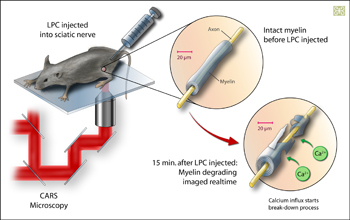|

Press Release 07-072
New Imaging Technique Could Promote Early Detection of Multiple Sclerosis

June 27, 2007
Researchers from Purdue University have studied and recorded how myelin degrades real-time in live mice using a new imaging technique. Myelin is the fatty sheath coating the axons, or nerve cells, that insulate and aid in efficient nerve fiber conduction. In diseases such as multiple sclerosis, the myelin sheath has been found to degrade.
This unprecedented feat of looking real-time at the actual progress of demyelination will advance understanding of and perhaps promote early detection of conditions such as multiple sclerosis.
Using a technique called coherent anti-Stokes Raman scattering microscopy, or CARS, scientists observed the injection of a compound called lysophosphatidylcholine (LPC) into the myelin of a mouse. Then, using CARS, they observed an influx of calcium ions into the myelin. This influx is now believed to start the process of myelin degradation.
The research was supported by the National Science Foundation.
-NSF-

Media Contacts
Lily Whiteman, National Science Foundation (703) 292-8310 lwhitema@nsf.gov
Related Websites
Purdue University News Link: http://news.uns.purdue.edu/x/2007a/070627ChengCARS.html

The National Science Foundation (NSF) is an independent federal agency that supports fundamental research and education across all fields of science and engineering. In fiscal year (FY) 2009, its budget is $9.5 billion, which includes $3.0 billion provided through the American Recovery and Reinvestment Act. NSF funds reach all 50 states through grants to over 1,900 universities and institutions. Each year, NSF receives about 44,400 competitive requests for funding, and makes over 11,500 new funding awards. NSF also awards over $400 million in professional and service contracts yearly.
 Get News Updates by Email Get News Updates by Email
Useful NSF Web Sites:
NSF Home Page: http://www.nsf.gov
NSF News: http://www.nsf.gov/news/
For the News Media: http://www.nsf.gov/news/newsroom.jsp
Science and Engineering Statistics: http://www.nsf.gov/statistics/
Awards Searches: http://www.nsf.gov/awardsearch/
| 

